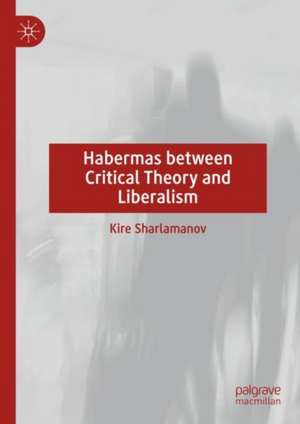Habermas between Critical Theory and Liberalism
Autor Kire Sharlamanoven Limba Engleză Hardback – 5 mar 2024
Preț: 728.74 lei
Preț vechi: 888.71 lei
-18% Nou
Puncte Express: 1093
Preț estimativ în valută:
139.46€ • 144.77$ • 116.29£
139.46€ • 144.77$ • 116.29£
Carte tipărită la comandă
Livrare economică 22 martie-05 aprilie
Preluare comenzi: 021 569.72.76
Specificații
ISBN-13: 9783031539374
ISBN-10: 3031539370
Pagini: 259
Ilustrații: IX, 259 p.
Dimensiuni: 148 x 210 mm
Greutate: 0.48 kg
Ediția:2024
Editura: Springer Nature Switzerland
Colecția Palgrave Macmillan
Locul publicării:Cham, Switzerland
ISBN-10: 3031539370
Pagini: 259
Ilustrații: IX, 259 p.
Dimensiuni: 148 x 210 mm
Greutate: 0.48 kg
Ediția:2024
Editura: Springer Nature Switzerland
Colecția Palgrave Macmillan
Locul publicării:Cham, Switzerland
Cuprins
1. Basic characteristics of Habermas' theoretical oeuvre.- 2. The attitude to the critical theory.- 3. The attitude to marxism.- 4. The public sphere.- 5. The communicative action.- 6. Discursive ethics (of morality).- 7. Discoursive theory of democracy.- 8. Discoursive theory of law.
Notă biografică
Kire Sharlamanov is Full Professor of Sociology at the International Balkan University, Skopje, Republic of North Macedonia. His specialty is in the field of political sociology. He is the author of several books and articles in the field of sociology. In 2022 Kire Sharlamanov was president of the Association of Sociologists of Macedonia.
Textul de pe ultima copertă
This book identifies the turning points in Habermas's work and his transition from one stage to another in the development of his theoretical oeuvre. Habermas began his academic career as part of the Frankfurt School, but the two key points at which his career changes trajectory are moving from historical materialism to normative idealism and playing with some of the ideas of liberalism. Normative idealism is an ahistorical theory that insists on the independence of the normative from material reality, severing the connection between base and superstructure that Marx wrote about. The break with the basic concepts of Marxism enabled Habermas to build his own discursive (critical) theory, which, especially since the end of the 1980s, takes the ideas of liberalism seriously. This book makes a systematic, multidimensional and detailed analysis of Habermas's theoretical oeuvre in two dimensions, chronological (in the order in which Habermas worked on certain topics) and thematic (enclosing certain thematic units).
Kire Sharlamanov is Full Professor of Sociology at the International Balkan University, Skopje, Republic of North Macedonia. His specialty is in the field of political sociology. He is the author of several books and articles in the field of sociology. In 2022 Kire Sharlamanov was president of the Association of Sociologists of Macedonia.
Caracteristici
Offers a fresh look at the thought of one of the most significant intellectuals in the last few decades Examines Habermas's work within the framework of the influence of critical theory and liberalism Provides a systematic analysis of Habermas's theoretical oeuvre both chronologically and thematically
